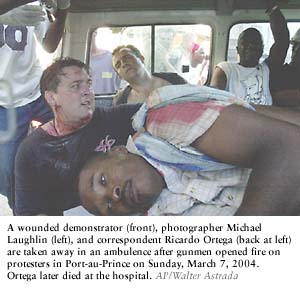Attacks on the Press 2003: Introduction
By Ann CooperIn real-time images, the war in Iraq splashed across television screens worldwide in March, with thousands of journalists covering the U.S.-led war against Saddam Hussein and his regime. The conflict and its aftermath had a far-reaching impact on the press and its ability to report the news, with the reverberations felt in some…
Attacks on the Press 2003: Americas Analysis
While violence and repression against the press continued unabated and even increased in some countries, public trust in journalists and the press suffered in much of the Americas, jeopardizing support for reforms of archaic press laws and opening the door for governments to take a more confrontational approach with the media.
Attacks on the Press 2003: Colombia
Colombian journalists continued paying an extremely heavy price for practicing their profession amid a 40-year-old civil war pitting two major leftist guerrilla groups against the Colombian army and right-wing paramilitary forces. At least four journalists were killed in reprisal for their work in 2003, and CPJ continues to investigate the deaths of three others.
Attacks on the Press 2003: Mexico
While the Mexican press was able to report more freely about government corruption, an increase in criminal defamation charges and government pressure on journalists to reveal their sources cast a pall over the media in 2003. As President Vicente Fox hit the halfway point of his six-year presidency, his chances of transforming the country were…
Attacks on the Press 2003: Panama
Panama is known for its institutionalized system of legal harassment against the press. Journalists there confront antiquated media laws that impose prison terms for defamation, criminalize criticism of public officials, and permit prior censorship. In July, Eduardo Bertoni, the Inter-American Commission on Human Rights’ special rapporteur for freedom of expression, visited Panama and recommended that…
Attacks on the Press 2003: Venezuela
The conflict between President Hugo Chávez Frías and the private media showed no signs of subsiding in 2003. In his weekly radio and TV call-in program “Aló, Presidente” (Hello, President) and in frequent speeches, Chávez continued to lambaste the private press and accuse media owners of being “coup-plotters” and “fascists.” Chávez continued to use cadenas–nationwide…
Attacks on the Press in 2003: Journalists in Prison
There were 138 journalists in prison around the world at the end of 2003 who were jailed for practicing their profession. The number is the same as last year. An analysis of the reasons behind this is contained in the introduction on page 10. At the beginning of 2004, CPJ sent letters of inquiry to…

JOURNALIST KILLED AND ANOTHER WOUNDED
New York, March 8, 2004—The Committee to Protect Journalists (CPJ) mourns the loss of a Spanish television journalist killed yesterday afternoon when gunmen opened fire on demonstrators in Haiti’s capital, Port-au-Prince. The demonstrators were calling for the prosecution of former President Jean-Bertrand Aristide. A U.S. photographer was also wounded in the incident.
THREE JOURNALISTS WOUNDED IN STREET CLASHES
New York, March 1, 2004—Three journalists were injured over the weekend while covering violent street clashes in Venezuela’s capital, Caracas, in the wake of a four-day antigovernment protest. The protesters were demanding a referendum to recall President Hugo Chávez Frías. On Friday, February 27, Venezuelan National Guard troops fired rubber bullets and threw tear gas…
CPJ DECRIES INCREASING VIOLENCE AGAINST JOURNALISTS
New York, February 24, 2004—The Committee to Protect Journalists (CPJ) is deeply concerned about an increasing number of violent attacks against journalists and radio stations in Haiti in the wake of a rebellion aimed at ousting President Jean-Bertrand Aristide. On Saturday, February 21, unidentified gunmen shot Pierre Elisem, director and owner of Radio Hispagnola, in…